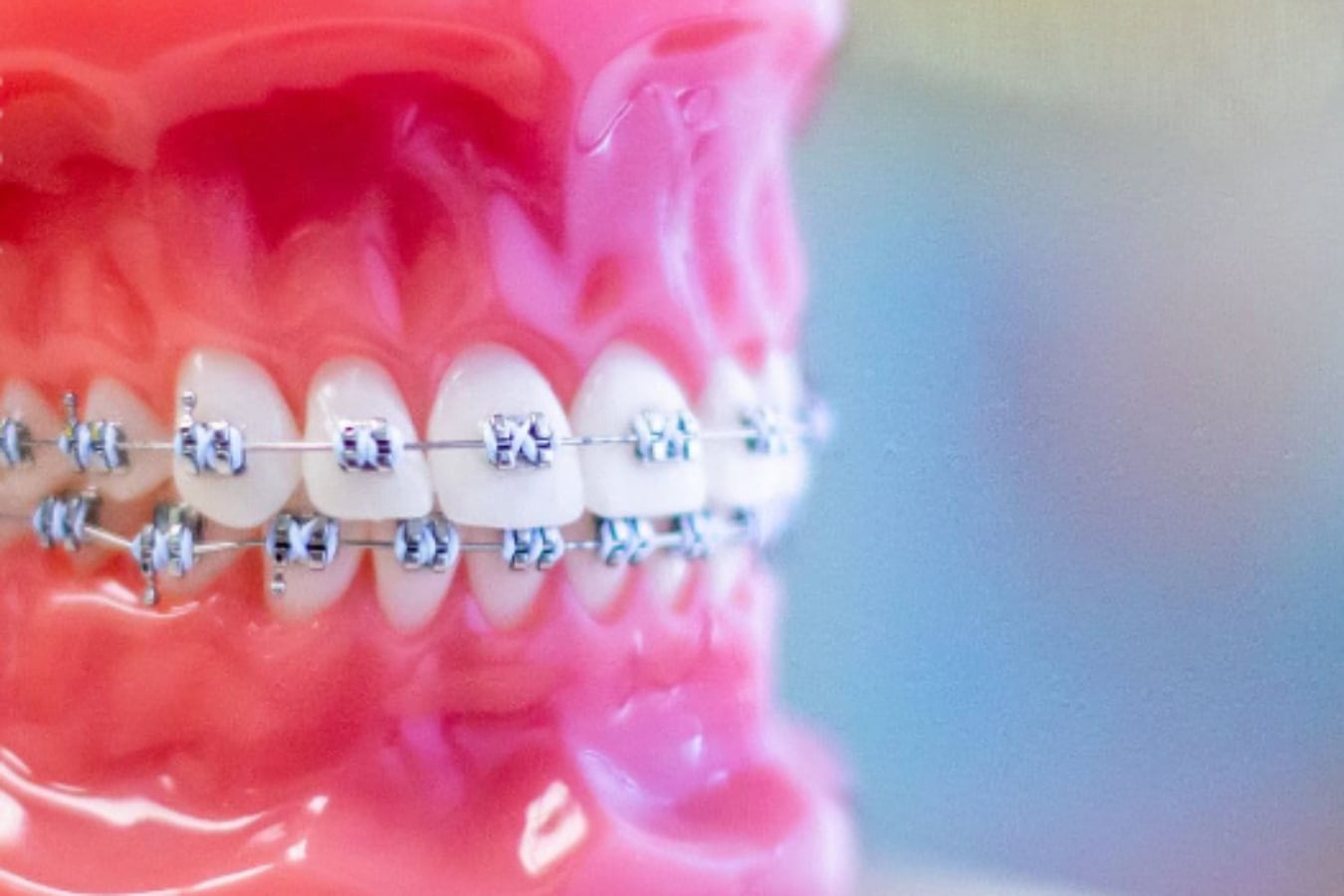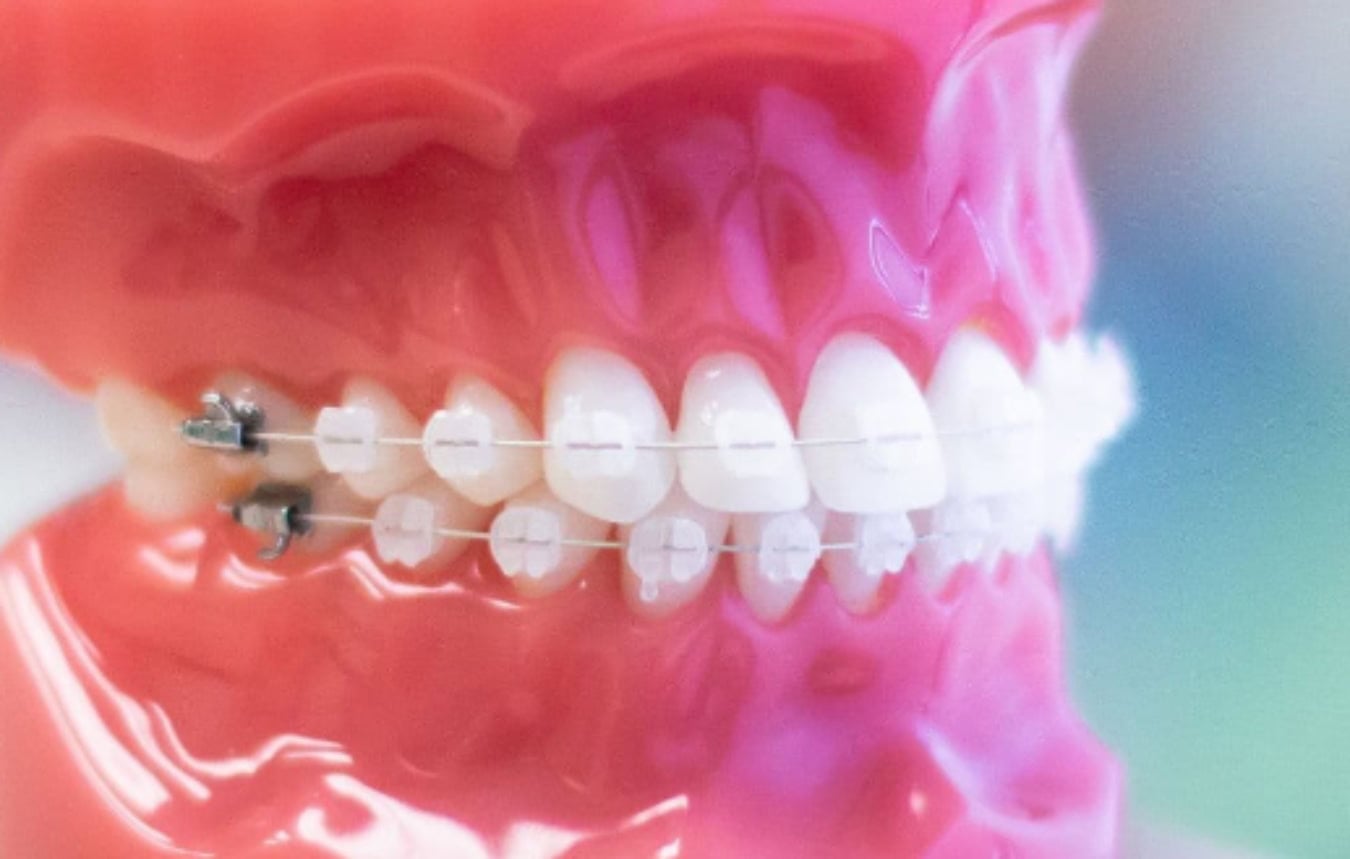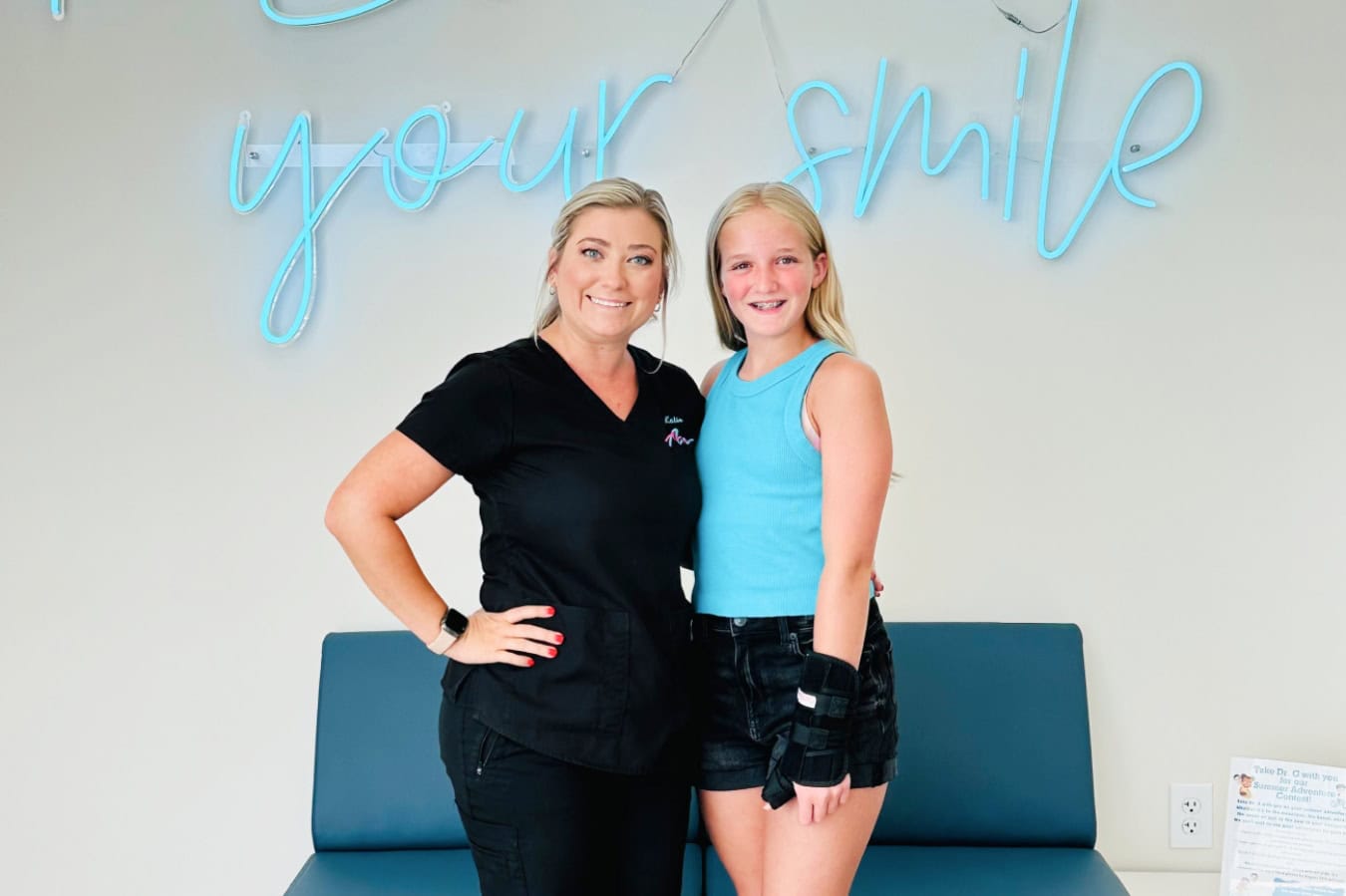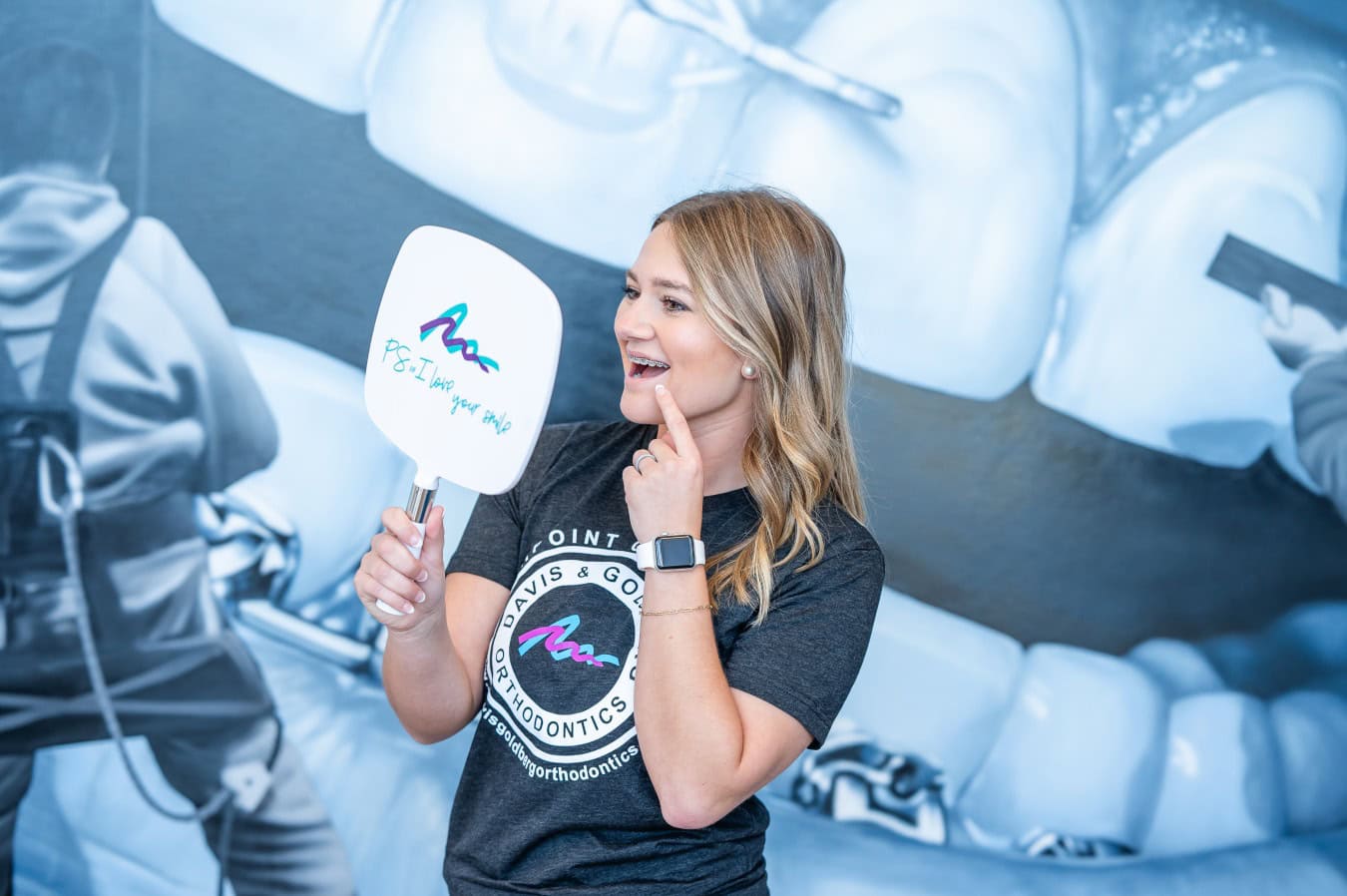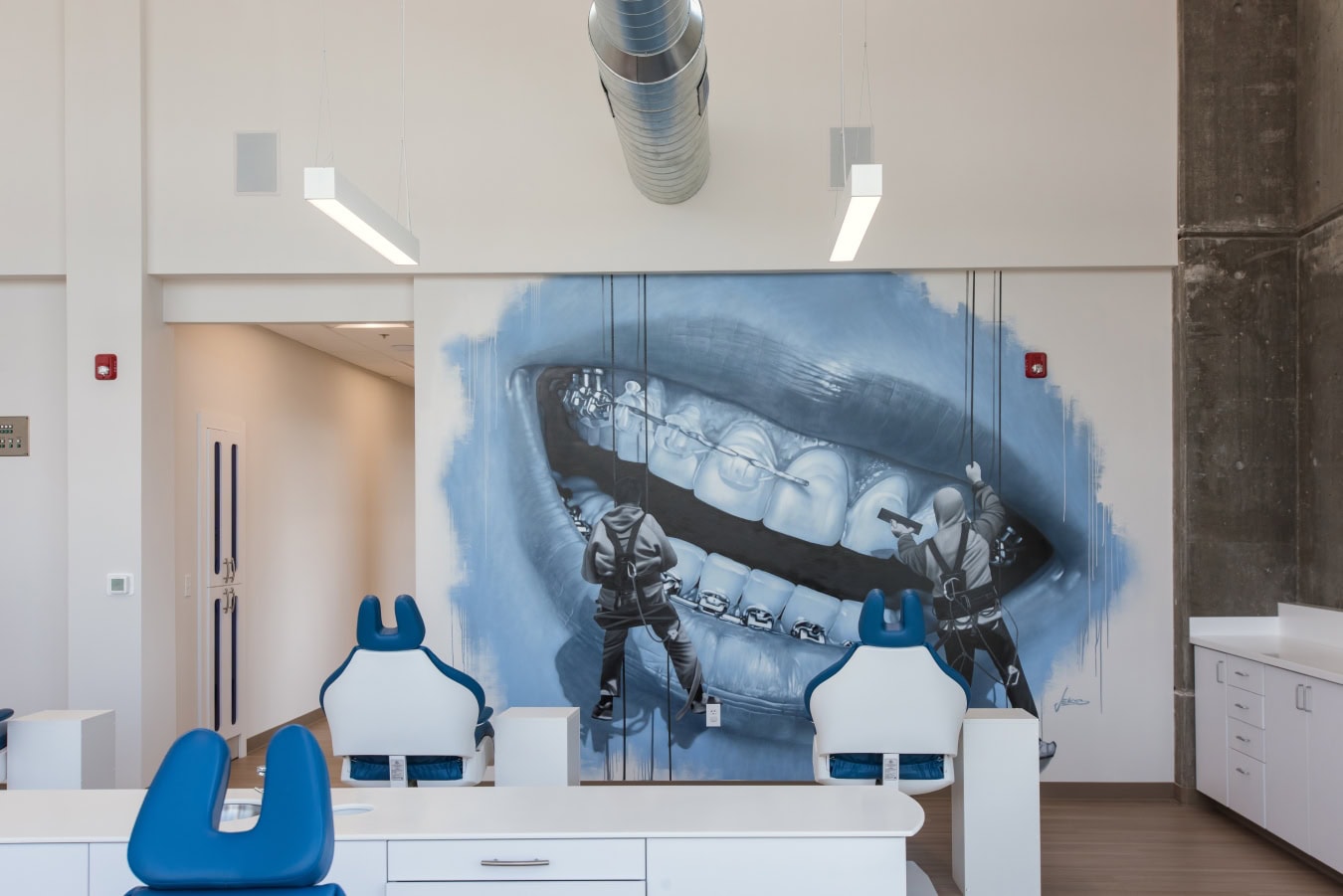Types of Braces
Braces are an orthodontic appliance that applies gentle force to the teeth, shifting them into better positions over time. This aligns the teeth and jaws and increases your oral health, giving you a functional smile that looks great and feels good, too. Here are some common questions we get from patients in Greensboro and High Point.
When many people think of braces, they think of extremely bulky and visible metal brackets. At Davis & Goldberg Orthodontics, we don’t use this type of bulky orthodontic appliance, and our metal braces are smaller, lighter, and more comfortable to wear than ever before.
Traditional Braces
Traditional braces have withstood the test of time and remain an iconic symbol of orthodontic treatment at Davis & Goldberg Orthodontics. We use these tried and true tools when addressing all kinds of orthodontic issues for patients.
Metal braces work by applying gentle pressure to gradually move your teeth into their proper positions, effectively addressing issues like overcrowding, gaps, and bite problems. With their strength and durability, they remain one of the most efficient and cost-effective ways to achieve a beautiful, well-aligned smile.
Our team customizes every treatment plan based on your individual needs, ensuring that the brackets and wires are placed with precision for optimal results. Metal braces are suitable for patients of all ages and are particularly effective for more complex orthodontic cases.
Why Do Patients Still Choose Metal Braces?
- Effective For All Types of Alignment Issues — Metal braces can correct even the most severe orthodontic problems, such as complex bite misalignments or significant crowding.
- Durable and Strong — Made from stainless steel, metal braces are built to withstand the forces needed to move your teeth into the correct position over time.
- Cost-Effective — Traditional metal braces tend to be more affordable compared to some of the newer orthodontic technologies, while still delivering excellent results.
Clear Self-Ligating Braces
Ceramic braces are also referred to as clear braces, tooth-colored braces, or aesthetic braces. They work the same way metal braces do.
Our patients in Greensboro and High Point love how they look more subtle than metal options. They’re smaller than ever and made of nearly invisible tooth-colored polycrystalline ceramic material. Since they blend right in with the natural color of your teeth, they’re more challenging to notice than traditional braces, even though the brackets are roughly the same size and shape.
Ceramic brackets are a low-profile approach to straightening your smile, especially when paired with clear, white, or tooth-colored wires and elastic ties. Our more aesthetic-minded patients at Davis & Goldberg Orthodontics are particularly happy with this approach.
Clear braces may make sense if you want the discretion of Invisalign without the hassle and responsibilities associated with remembering to wear and clean your aligners.
How do Self-Ligating Braces Work?
Self-ligating braces use a specialized clip or sliding mechanism instead of traditional elastic ties to hold the archwire in place. This design allows the wire to move more freely, reducing friction and often resulting in shorter treatment times and fewer adjustments. The reduced pressure on the teeth can make the experience more comfortable, while still providing effective results. Combined with the aesthetic appearance of clear braces, the self-ligating system is a great option for patients seeking a more efficient and convenient orthodontic treatment.
Braces For Kids
At Davis & Goldberg Orthodontics, we believe early orthodontic care is key to ensuring your child’s teeth and jaws develop properly. Braces for kids are often part of a two-phase treatment, where we monitor and guide dental growth to prevent more serious issues later on. Starting braces early, typically between ages seven and ten, can address problems like crowding, improper bite, and jaw misalignment before they become more complex.
Why Start Early?
The American Association of Orthodontists recommends children have their first orthodontic evaluation by age seven. At this age, the jaw is still growing, and we can guide it in a way that helps prevent future complications. Early treatment, which may include braces, expanders, or other appliances, allows us to create space for incoming permanent teeth, correct bite problems, and improve jaw alignment. This proactive approach often results in shorter, less complicated treatment later.
What Are the Benefits of Braces for Kids?
- Correct Early Issues — Braces can correct problems such as crowding, crossbites, and underbites, setting the stage for a healthy, well-aligned smile.
- Avoid More Invasive Treatments — By addressing orthodontic concerns early, we can often prevent the need for more invasive treatments, like extractions or jaw surgery, in the future.
- Boost Confidence — Having braces at an early age can help kids feel more confident about their developing smile.
At Davis & Goldberg Orthodontics, we create personalized treatment plans for each child, ensuring that braces are applied at the right time and in the most effective way. Whether your child needs traditional metal braces or a more specialized solution, our team is dedicated to providing gentle, high-quality care in a comfortable environment. We’ll walk with you through every step of the process, making sure your child’s experience with braces is positive and rewarding.
Join Our Kids Club
We love meeting young patients who are excited to be proactive with their orthodontic care. If your child is not quite ready for orthodontic treatment when they come in for their first free consultation, we’ll invite them to join the Davis & Goldberg Kids Club and Pre-Orthodontic Observation Program!
Members of our free Kids Club are invited to see us every six months for a free orthodontic evaluation. Members will also receive a VIP card and special bracelet, which they can use to enter biannual drawings for awesome grand prizes like electric scooters, gaming consoles, gift cards, and more!
Note that, like all new patient appointments at Davis & Goldberg Orthodontics, Kids Club appointments don’t require referrals and are totally no-charge until your child is ready for treatment.
Braces For Teens
For teens, braces are a common step in achieving a healthy, confident smile. At Davis & Goldberg Orthodontics, we understand that adolescence is a time of change, and we offer a variety of orthodontic options that not only address dental concerns but also fit into your teen’s busy lifestyle. No matter the level of correction your teen’s smile may need, we customize each treatment to meet their specific needs.
Addressing Teen Orthodontic Needs
During the teenage years, most or all permanent teeth have erupted, making it the ideal time for comprehensive orthodontic treatment. Braces can correct common issues such as overcrowding, misaligned bites, and gaps, ensuring that your teen’s teeth will develop in a healthy, functional way. Correcting these issues during adolescence can prevent dental problems in adulthood, like excessive wear on the teeth, jaw pain, and difficulty chewing.
Confidence & Convenience
We know that teens are balancing school, sports, and social activities, which is why we aim to make orthodontic care as convenient as possible. With options like clear braces, your teen can receive effective treatment without feeling self-conscious about their smile. We offer flexible scheduling and work closely with you to ensure that your teen’s braces fit seamlessly into their life.
At Davis & Goldberg Orthodontics, we’re committed to providing high-quality, personalized care for teens. Our goal is to help your teen achieve a beautiful, confident smile that will last a lifetime. Contact us today to request a consultation and find out which treatment option is right for your teen!
Braces For Adults
It’s never too late to achieve the smile you’ve always wanted. At Davis & Goldberg Orthodontics, we offer a variety of braces options tailored to meet the unique needs of adults. Whether you’re looking to fix alignment issues, correct bite problems, or simply enhance your smile, our customized treatment plans are designed to fit your lifestyle.
Orthodontic treatment for adults can address a wide range of issues, including overcrowding, gaps, or bite irregularities. Many adults also seek orthodontic care to improve their oral health, as misaligned teeth can lead to issues like gum disease, excessive tooth wear, and jaw pain. By investing in orthodontic treatment, you’re not only improving the appearance of your smile but also boosting your overall dental health.
Benefits of Adult Braces
Orthodontic treatment as an adult can improve more than just the appearance of your smile. Properly aligned teeth are easier to clean, which can reduce the risk of tooth decay and gum disease. Additionally, correcting bite issues can relieve stress on your jaw, prevent uneven wear on teeth, and even alleviate chronic jaw pain or headaches.
For adults who may have missed out on braces as a child, or whose teeth have shifted over time, now is the perfect time to consider orthodontic care. Our team at Davis & Goldberg Orthodontics will work with you to create a treatment plan that fits your specific needs and lifestyle, helping you achieve the beautiful, healthy smile you deserve.
If you’re considering braces as an adult, you’re not alone. More and more adults are choosing orthodontic treatment to improve their smile and oral health. Contact us today to request a consultation and learn more about the options available to you at Davis & Goldberg Orthodontics. We’re here to help you every step of the way on your journey to a better smile!
Braces Care
Doing Your Part
To get the healthy and beautiful smile you want, you’ll need to work as a team with your family dentist and your orthodontist. You play an essential part. Making sure your treatment is successful is up to you.
Most importantly, you must maintain good dental hygiene and keep your teeth clean while wearing braces. Proper dental care will take a little extra time and effort, but the results are well worth it. It will help you enjoy the best possible smile from your orthodontic treatment. Take especially good care of your teeth during orthodontic treatment.
By brushing and flossing regularly, you’ll keep your teeth and gums at their best and ensure that your orthodontic treatment will deliver the healthiest smile possible.
Brushing Your Teeth
You’ll probably notice very quickly that it’s much harder to keep your teeth clean when you’re wearing braces. Food can easily get caught in the brackets and between your teeth.
Brushing after meals and flossing will help prevent plaque from forming and should become part of your daily schedule.
If plaque remains on the teeth for any length of time, it can leave a permanent white scar on the surface. A waterpik or an electric toothbrush can be a useful addition, however, please continue to see your dentist at least every six months for regular dental cleanings.
How To Brush
During your braces treatment, you will need to relearn the basics of brushing your teeth. Relearning this everyday task will teach you to pay attention to the cracks and crevices not only between teeth but around brackets and wires.
Keep these tips in mind when brushing your teeth with braces:
- Use a fluoride toothpaste and a soft, rounded-bristle toothbrush that’s in good condition.
- Because braces wear out a toothbrush quickly, replace your brush as soon as it shows signs of wear.
- Brush around all the parts of your braces and every surface of your teeth — fronts, sides, and backs. Be sure to brush your tongue and the roof of your mouth. A good way to tell if you’re brushing correctly is if your braces look clean and shiny, and you can clearly see the edges of the brackets.
- Brush your gums gently and thoroughly.
- Rinse thoroughly after brushing.
- Inspect your teeth and braces carefully to make sure they are spotless. Look closely in a well-lighted mirror. This is a good time to check for loose or broken brackets. If you find a problem, contact Davis & Goldberg Orthodontics to see if it needs to be checked out and if we need to schedule a time to make a repair.
How To Floss
Flossing with braces takes a few minutes to master, but the effort is well worth it. The first step to flossing is getting the floss under the wire that connects the braces together.
A floss threader will help you get the dental floss underneath your archwires. Dental floss with a stiff end is also available. It’s pre-cut and is very easy to insert underneath archwires.
Once the floss is under the archwire, it can be wrapped around the tooth on one side. The floss is then pushed up toward the gum line and then pulled down toward the wire. This should be repeated four to five times to ensure all plaque is removed.
Be careful not to put too much pressure on the wire as you pull down. Then wrap the floss around the neighboring tooth. Once both teeth are done, the floss is pulled out, and the process is repeated for the next two teeth.
Hygiene Helpers
In addition to the regular dental hygiene tools we are familiar with like toothbrushes and floss, there are a few products we can recommend that make brushing teeth with braces a little easier to manage.
- Interproximal Brush: This tool slips under your archwire to more completely remove plaque and food particles near your brackets.
- Prescription Fluoride Toothpaste or Fluoride Rinse: Use once a day as part of your cleaning routine, if prescribed by Dr. Goldberg & Dr. Davis. For the best results, use with your interproximal brush to deliver maximum fluoride protection to your teeth.
- Power Toothbrush or Waterpik: These devices, such as the Oral-B Professional Series toothbrush, are designed to make brushing easier and more efficient.
The Importance of Dental Health
Good dental hygiene is critical during orthodontic treatment. Without it, plaque and food can accumulate around your braces.
The bacteria in plaque react with sugars and starches in food and form an acid that can eat away the enamel on your teeth, leading to white marks, cavities, or gum disease.
- If plaque accumulates around your braces, it can leave permanent stains on your teeth called decalcification. Lines and spots from decalcification will remain on your teeth for life.
- Periodontal disease, caused by the build-up of plaque, occurs in three stages. In the first stage, plaque accumulation irritates the gums. Your gums may be puffy or swollen. They may bleed when you brush or floss. This is called gingivitis.
- Over time, the build-up of plaque may harden into a substance called tartar. As tartar accumulates, gaps or pockets may form between your gums and teeth. Even more tartar can be collected in these pockets. This is called periodontitis.
- Pockets of bacteria form and deepen beneath your gums, attacking and destroying the bone that anchors your teeth. This can even cause healthy teeth to loosen or eventually fall out. This is called advanced periodontitis. Early gum disease is reversible with professional help and good home care, but if you ignore it, it can get worse.
Gum disease is usually painless so you need to pay attention to signs like bleeding or swollen and puffy gums.
Avoid these problems by carefully following the hygiene directions you receive from our team.
Tips For Maintaining Dental Health
- Achieve a balanced diet. This can be achieved by eating a variety of foods, preferably from each of the five major food groups: bread, cereals, and other grain products; fruits; vegetables; meat, poultry, and fish; milk, cheese, and yogurt.
- Limit the number of snacks that you eat. If you do snack, choose nutritious foods, such as cheese, raw vegetables, plain yogurt, or a piece of fruit. Each time that you eat foods that contain sugars or starches brush your teeth.
- Brush after meals and before bedtime with fluoride toothpaste. Clean between your teeth daily with floss or interdental cleaners.
- Maintain your regularly scheduled check-ups with your dentist.

